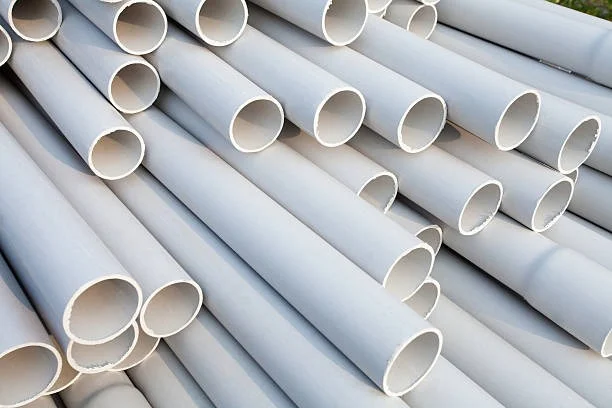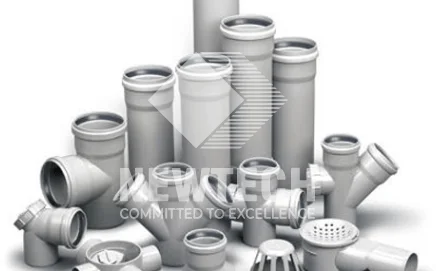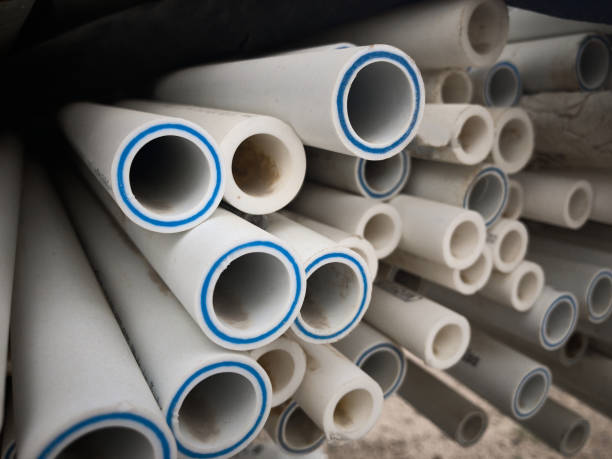PVC Pipes vs UPVC Pipes

UPVC and PVC are two types of Plastic piping commonly used in the construction of residential and commercial buildings, but some crucial differences between them can have an impact on the performance and durability of your home or business building.
For example, UPVC pipes are known to be more durable and flexible than PVC pipes, which makes them a better choice if you’re planning on remodelling or renovating your home shortly.
If you want to know more about PVC Pipes vs UPVC Pipes (differences between UPVC and PVC pipes), keep reading this guide!
What is a PVC Pipe?
PVC pipe is a type of plastic piping system that is used for a variety of applications. It is made from a thermoplastic resin and it is very strong and durable. PVC pipe can be used for both hot and cold water applications.
It is also resistant to many chemicals. PVC pipes are often the most economical choice for plumbing because they are more flexible than metal pipes, so they are easier to install in tight spaces.
PVC pipes are available in a range of diameters and wall thicknesses, including standard, extra heavy duty, high pressure, and lightweight types.

What is UPVC Pipe?
UPVC pipes are made of unplasticized polyvinyl chloride. This material is strong and resistant to many chemicals, making it ideal for a variety of applications.
UPVC pipes are more expensive than PVC pipes, but they offer some advantages. For example, UPVC pipes are more durable and have a longer lifespan.
They are also less likely to leak and easier to install. Finally, uPVC pipes can be used with other materials such as copper or aluminium because they can be joined together with butt joints or connections.
Difference between PVC and uPVC pipes | PVC Pipes vs UPVC Pipes
Though both types of pipes are made from the same material, there are a few key differences between PVC and UPVC pipes.
Below are notable differences between PVC and UPVC pipes:
Manufacturing Phases
PVC Pipe is usually perplexing and sturdy because of the rigidity of polymer PVC. To burst this hardness and make PVC pipe flexible, a plasticizing polymer is added to PVC during the manufacture of PVC pipe.
In contrast, uPVC (unplasticized polyvinyl chloride) has no such phase in its production process; leading it to be stiffer and less bendable than other types of pipes- not as flexible as those made out of PVC.
Applications Of PVC Pipes vs UPVC Pipes
Pipes made from either PVC or UPVC are primarily used for plumbing.
You may have heard that PVC pipes are the best option when it comes to irrigation, plumbing, and pool circulation systems because they’re less rigid than aluminium or copper pipes.
This is true because while you can’t cut them into custom lengths easily like you can with PVC, you can use glue to attach them which makes them easier to work with than if they were rigid.
UPVC pipes may also be appropriate when there’s a need for strong yet flexible materials – think heavy-duty water transport or an industry where steel would suffice (though plastic doesn’t rust).

Fittings Of PVC Pipes vs UPVC Pipes
Although uPVC pipe fittings are strong and stiff, they’re relatively simple to work with. UPVC pipe made by well-known brands such as Skipper Limited is lightweight enough for easy installation using glue.
There’s one big perk of light plastic: the cost associated with transporting and installing it can be lowered significantly.
On the other hand, the installation of PVC may be a little more complicated.
Durability Of PVC Pipes vs UPVC Pipes
Both PVC and uPVC piping are made to last long-lasting. UPVC pipes, however, tend to last longer than PVC pipes because they reduce air infiltration to keep your indoor spaces comfortable.
Safety and Risks
PVC Pipes can introduce health hazards as PVC-coated wires can form HCl fumes in a fire due to Plasticizers that are being used in its manufacturing.
Phthalates such as benzyl butyl, Dibutyl, and DEHP are some of the harmful substances that are used in PVC pipes to make them flexible, these have been restricted and banned in Pakistan over the years.
To have the flexible quality endurable, many manufacturers have replaced Plasticizers with safer ones.
To date, there are no mainstream concerns regarding the use of uPVC Pipes, as it does not use phthalates or BPA during the manufacturing process.
Even, UPVC pipe is recyclable and can be reshaped into new forms at immense temperatures.
Advantages of PVC pipes
- PVC pipes are strong and durable, making them ideal for a variety of applications.
- They are also resistant to corrosion and chemicals, which makes them a good choice for plumbing and industrial applications.
- These Pipes are also easy to install and require little maintenance.
Advantages of UPVC Pipes
- UPVC pipes are more durable than PVC pipes. They can withstand high temperatures and pressures, making them ideal for hot water systems.
- UPVC pipes are less likely to corrode than PVC pipes. This means they have a longer lifespan and require less maintenance.
- UPVC pipes are easier to install than PVC pipes. This is because they are lighter in weight and can be joined using solvent-welding methods.
Conclusion Of PVC Pipes vs UPVC Pipes
After reading this blog post, you should have a better understanding of the difference between PVC and UPVC pipes. While both types of pipes are made from PVC, UPVC pipes are stronger and more durable.
UPVC pipes are also less likely to leak. If you’re not sure which type of pipe to use for your project, feel free to contact us. We will be able to give you advice on the best option for your needs.

In summary, understanding the disparities between PVC and UPVC pipes is crucial for making informed decisions about construction materials. While PVC pipes offer flexibility and cost-effectiveness, UPVC pipes excel in durability, resistance to corrosion, and suitability for high-pressure and high-temperature applications. Moreover, UPVC pipes mitigate health risks associated with PVC, making them a safer choice for long-term use. Whether it’s for residential or commercial projects, selecting the appropriate type of piping can significantly impact the efficiency, longevity, and safety of the plumbing system. At Newtech Pipes, we prioritize providing high-quality solutions that align with sustainability and innovation, ensuring a resilient and eco-conscious approach to infrastructure development.

